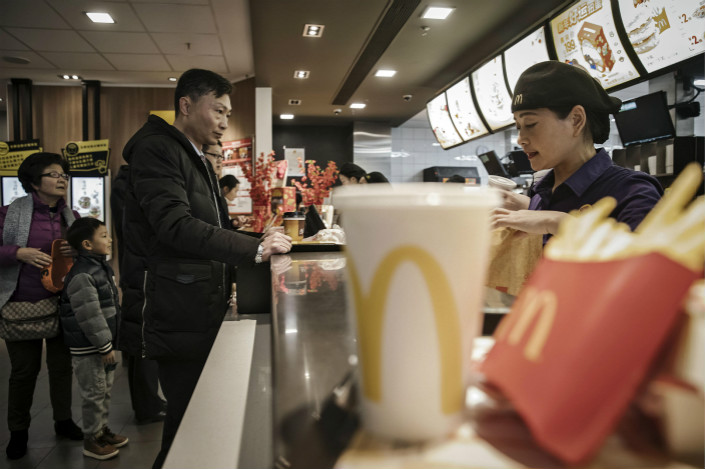McDonald’s Reiterates Commitment to Food Safety in China

Fast-food giant McDonald’s Corp. said its food safety standards for China remain the same as for the rest of the world, following its disclosure that the country wasn’t included in the first round of markets for its new program to reduce antibiotic use in chickens and other meat.
China is on track to become McDonald’s second-largest market, after only the U.S., with plans for 4,500 stores there by 2022. But the broader market is also one that has been rocked by food safety scandals, including one in 2012 that saw rival KFC take a hit after inspectors found that chickens from one of its suppliers contained excessive antibiotics.
China has strict rules regarding the use of antibiotics in chickens and other animals, but such rules are sometimes disregarded by farmers over concerns about protecting their investments. In addition to causing potential health risk to humans, such overuse also creates a larger danger of helping create “superbugs” that are immune to current antibiotics.
To reduce those risks, McDonald’s said this week it will begin a program to curb the use of antibiotics in its chickens and other meats starting in 2018. It said that by the start of next year, all antibiotics defined by the World Health Organization as “highest priority critically important antimicrobials” will be phased out from its chickens in the U.S., Canada, Europe, Japan, South Korea and Brazil.
China’s absence on the list, despite the market’s huge size, prompted some to question the omission. McDonald’s responded by saying its goals for food safety are the same in China as they are for the rest of the world.
“In raising poultry, the appropriate use of antibiotics in the process of controlling illness is critical,” it said in a statement. “Our suppliers (in China) will use medications under the supervision of veterinarians. The types of medicines, method of use and volumes must strictly conform to China’s laws. … Chicken used in restaurants will undergo relevant inspections, including testing in third-party laboratories of random samples.”
The issue of double standards is a sensitive one as China, where people sometimes feel they are treated as second-class citizens by big multinationals compared with consumers in other countries. Food safety has also been an issue for the last decade, dating back to a scandal involving the discovery of the industrial chemical melamine in dairy products.
Despite the potential for criticism over double standards, talk surrounding the subject was generally muted on Weibo, China’s equivalent of Twitter. Some pointed the finger at their own country for its relatively low standards, and others focused on recent sale of most of the McDonald’s restaurants in China to a pair of third-party investors in a franchising-style arrangement.
“Whenever there’s a big decision outside, China is never first on the first list,” said TBNeiyouhuijuan, one of the few users who commented directly on the issue. “Or, to be more precise, it’s not on the list at all.”
Contact reporter Yang Ge (geyang@caixin.com)

- 1China Officials Dismiss Tax Hike Rumors After Tech Selloff
- 2Cover Story: How Gutter Oil Became a Prized Fuel for International Airlines
- 3Maersk Unit Takes Over CK Hutchison Panama Ports After Court Ruling
- 4Prominent Chinese Journalist Liu Hu Detained by Police in Chengdu
- 5China Provinces Set Cautious 2026 Growth Targets
- 1Power To The People: Pintec Serves A Booming Consumer Class
- 2Largest hotel group in Europe accepts UnionPay
- 3UnionPay mobile QuickPass debuts in Hong Kong
- 4UnionPay International launches premium catering privilege U Dining Collection
- 5UnionPay International’s U Plan has covered over 1600 stores overseas




